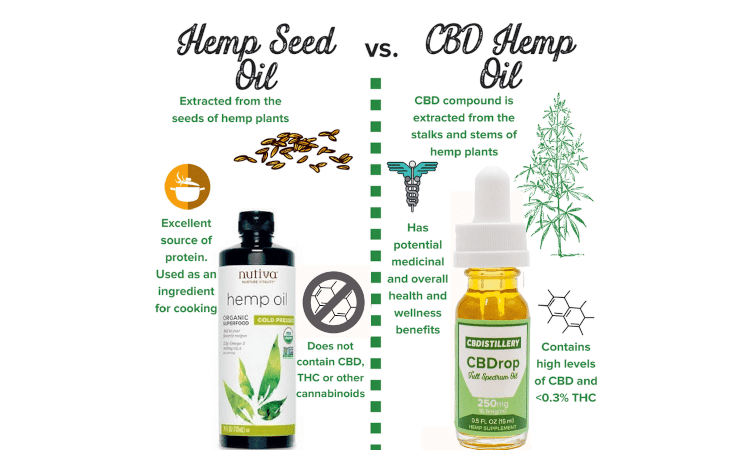CBD vs. Hemp: What’s the Difference
Medical cannabis is prescription cannabidiol that has been used for years to treat seizure disorders. CBD is also known to be used for anxiety disorders, chronic pain, and neurological disorders. With the recent legalization of marijuana, there has been a boom in cannabis products or hemp products on the market. Even though it has been legalized, it is still not an FDA-approved drug which means it can not be included in foods or dietary supplements. CBD is allowed to be in cosmetic products though. With some products marketed as hemp oil, hemp seed oil, and CBD oil, you can see the confusion. Hemp and CBD are words that are often used interchangeably. It is good to note the distinction between CBD Hemp Oil (phytocannabinoids from hemp extract aerial parts) and hemp seed oil (extract from the seed only). Although they do come from the same plant, there is a difference in the effects and benefits of each one.
Hemp Vs. Marijuana Cannabis Plant
Another common misunderstanding is that many think that marijuana and hemp are the same plants. Both hemp and marijuana belong to the same species, Cannabis Sativa, and look similar, but their tetrahydrocannabinol (THC) content is different. THC is the primary psychoactive compound in cannabis that produces a high sensation. Legally, hemp is defined as a cannabis plant containing 0.3 percent or less THC, while marijuana is cannabis-derived with more than 0.3 percent THC. Non psychotropic plant cannabinoids does not produce mind-altering effects like changes in mood, perception, cognition, or behavior.
CBD Oil
CBD is extracted from the stalks, leaves, and flowers of the hemp plant, which has a higher concentration of cannabidiol CBD and is known for potential health benefits. CBD products on the market can be found in different forms.
Full-spectrum CBD - contains all compounds of the cannabis plant, including a low level of THC.
Broad-spectrum CBD - contains several compounds of plant cannabinoids, not including THC.
CBD Isolate - a pure form of CBD containing no other compounds of the cannabis plant.
Benefits of Cannabidiol CBD
CBD claims to treat a variety of health problems, including:
- Acne -CBD oil helps soothe irritation caused by acne, noticeably reducing overall redness and making breakouts appear smaller and less painful.
- Anxiety Disorders- Although it has not been conducted in human studies, cannabidiol extracts are believed to regulate serotonin levels the same way the controlled substance for antidepressant and anti-anxiety medications work.
- Chronic pain - Medical marijuana helps to treat neuropathic pain. Cannabidiol inhibits the release of neurotransmitters and neuropeptides and reduces neural inflammation.
- Depression - Cannabis derived products for depression are believed to regulate serotonin levels the same way for anxiety.
- Drug use and withdrawal
- Epilepsy - Evidence suggests that CBD reduces the number of seizures in people with certain disorders and neurological diseases. Cannabis sativa constituent for seizures is the only FDA approved drug.
- High blood pressure - Cannabis derived products are known to help with factors such as stress, anxiety, and poor sleep quality that can affect blood pressure.
- Insomnia - Broad spectrum CBD that doesn't contain THC aids patients in relaxation and sleep. Although it is promoted as a sleep aid, it can have adverse reactions resulting in the opposite effects.
- Muscle spasms - Clinical trials shows that CBD oil work through cannabinoid receptors to reduce muscle spasms by altering the way the central nervous system communicates with your muscles; this is what makes it so effective in treating multiple sclerosis.
- Parkinson's disease - Medical cannabis derived products has been shown to have anti-inflammatory and antioxidant properties. Inflammation in the nervous system has been linked to neurodegeneration and therefore it has been hypothesized that CBD might even be beneficial as a neuroprotective agent and helpful in treating several other neurological disorders. There has been no clinical research regarding the effectiveness of CBD in Alzheimer's disease.
- Appetite Suppresant- Most people associate cannabis with a stimulated appetite, as people tend to feel hungry after using cannabis. While THC may cause hunger, many proponents say that CBD can help a person lose weight by reducing their appetite.
Hemp Seed Oil
Hemp extract is made by extracting oil from the seeds of the Cannabis sativa plant. It contains omega-6 and omega-3 fatty acids, gamma-linolenic acid, and other nutritional antioxidants. It is also high in B vitamins, and vitamin D. Hemp seed oil contains little to no THC, so it will not likely cause any psychoactive effects.
Benefits of Hemp Seed Oil
- Improve skin
- Lower blood pressure
- Promotes heart health
- Inflammation reduction
Is CBD safe to use?
There is a gray area when it comes to safety concerns regarding the use of cannabidiol cbd since there is no FDA regulation in forms of dietary supplement. Users should be aware of any adverse effects that CBD may have with interaction sof other medications.
Recent Posts
-
Peptides For Skin: Exploring the Anti-Aging Benefits of Peptides in Skincare
Exploring the Anti-Aging Benefits of Peptides in Skincare In the universe of advanced skincare, th …Apr 25th 2024 -
Discover the Perfect Glasses & Styles to Enhance Your Rectangle Face Shape!
Your face shape plays a significant role in determining the most flattering hairstyles and makeup te …Apr 17th 2024 -
Moroccanoil Treatment for Hair: The Ultimate Guide
Moroccanoil Treatment for Hair: The Ultimate Guide In the world of hair care, few products have …Apr 1st 2024




